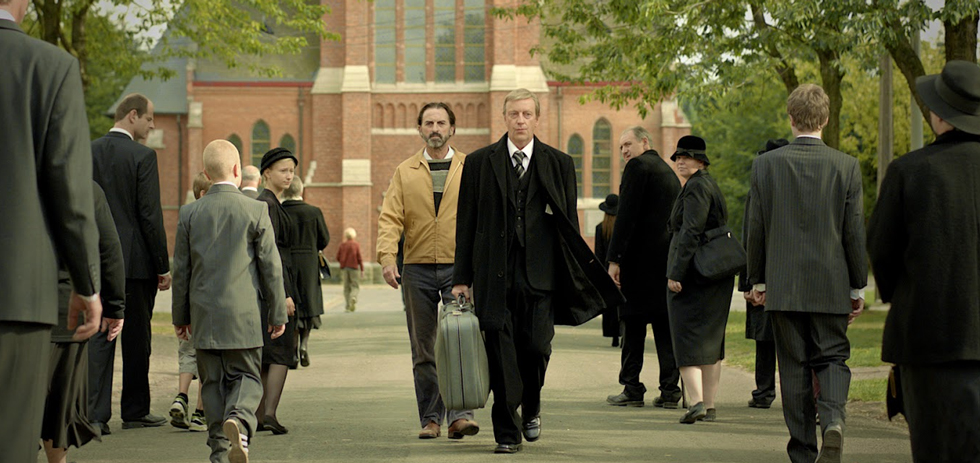
The idea of an outsider coaxing a protagonist out of their shell is a fairly tired trope in fiction generally, though some films manage to transcend it by playing with form or narrative reveal. Matterhorn, written and directed by comedian Diederik Ebbinge, seems to actively set itself apart by focusing less on broad humour than setting up emotional beats and an almost sombre development of a relationship between the central two figures.
The two men at the heart of the film are Fred (Ton Kas), a widower whose devotion to the Christian faith seems to be tied up in his state of depression, and a mysterious drifter (René van ‘t Hof), who seems to be suffering from some sort of mental incapacitation. When Fred discovers the drifter conning neighbours out of gas, he forces him to clean the grout out of the tiles in his front yard, before rewarding him with some biscuits. Suddenly, tied up both in his religious teachings of the Good Samaritan and his intense loneliness, he invites the man into his house for dinner and to stay the night. The two men form a business partnership, of sorts, when the drifter’s ability to mimic animal noises attracts the attention of a man looking for performers for his daughter’s birthday party, and decide to raise funds for a trip to the Matterhorn.
While there are some compelling sequences with regard to religion and ignorant obedience, much of the film’s problems stem from this characterisation. Despite the clear need for a replacement for his wife and son and the usage of the drifter as that replacement, there’s an uncomfortable sense of oversimplification in how these characters interact. Whilst there are elements of sexual and fraternal attraction, the fact that the drifter is clearly a person with mental difficulties and a reduced sense of comprehension makes Fred’s co-opting of him somewhat predatory and selfish. Despite the element of providing security and shelter and food for the man, this sense of ‘using’ someone carried over into their performances for children and diminished much of the character-based humour that was intended. The antagonist of the film, an even more devout man, is fairly cartoonish in his character development, only to have an overly abrupt change based on one line of dialogue.
There are elements of the screenplay to be praised, for one, a reveal with regards to Fred’s son is an incredibly effective piece of misdirection and thematic connection, providing a real and tangible emotional hook in the film. A similar reveal, that of the identity and circumstances of van ‘t Hof’s character, is clever on a narrative level yet doesn’t necessarily provide genuine relief from the overly simplistic characterisation early on. In other words. the backstory doesn’t necessarily undo the uncomfortable tone of the first half-hour of the film – while plot may be satisfied, emotional engagement is not. The film is also problematic in its depiction of women – there is only one female character, who fulfils a role of a caretaker narratively but a mother substitute actually, but the main issue is in the depiction of Fred’s late wife, who never really seems anything more than a possession to the men in the film, with lines of dialogue to this exact effect.
The film’s cinematography doesn’t do anything of note, while the juxtaposition between the grey and drab interior of Fred’s house and the slight warmth of the natural landscape outside is clear, it is an obvious visual choice. The choice to rely on repetition of events and shots is also too obvious a motif, even when the film attempts to break from this cycle with a scene in which the two men walk away from their church on a Sunday, the film holds onto cliché and bluntness. Adding to this lack of subtlety, the film’s conclusion occurs at its emotional climax, almost rushing to its credits as it lazily merges its two plotlines. That’s not to say the sequence isn’t affecting – as mentioned before, the plotline with Fred’s son is fairly powerful – just that by lumping these two together (through a montage!) it does undercut any actual reflection on the circumstances presented. In fact, the sudden appearance of this Matterhorn montage serves as a reminder of just how lightly constructed the idea of ‘Matterhorn’ actually is in the film as a whole.
The film does have its moments but its tone and lack of inventiveness marred most of the viewing experience. The performances within are uniformly solid, if at times a little broad. The direction is serviceable, but on the whole the film didn’t coalesce effectively enough on an emotional level to move beyond the narrative tropes it sets up for itself.
